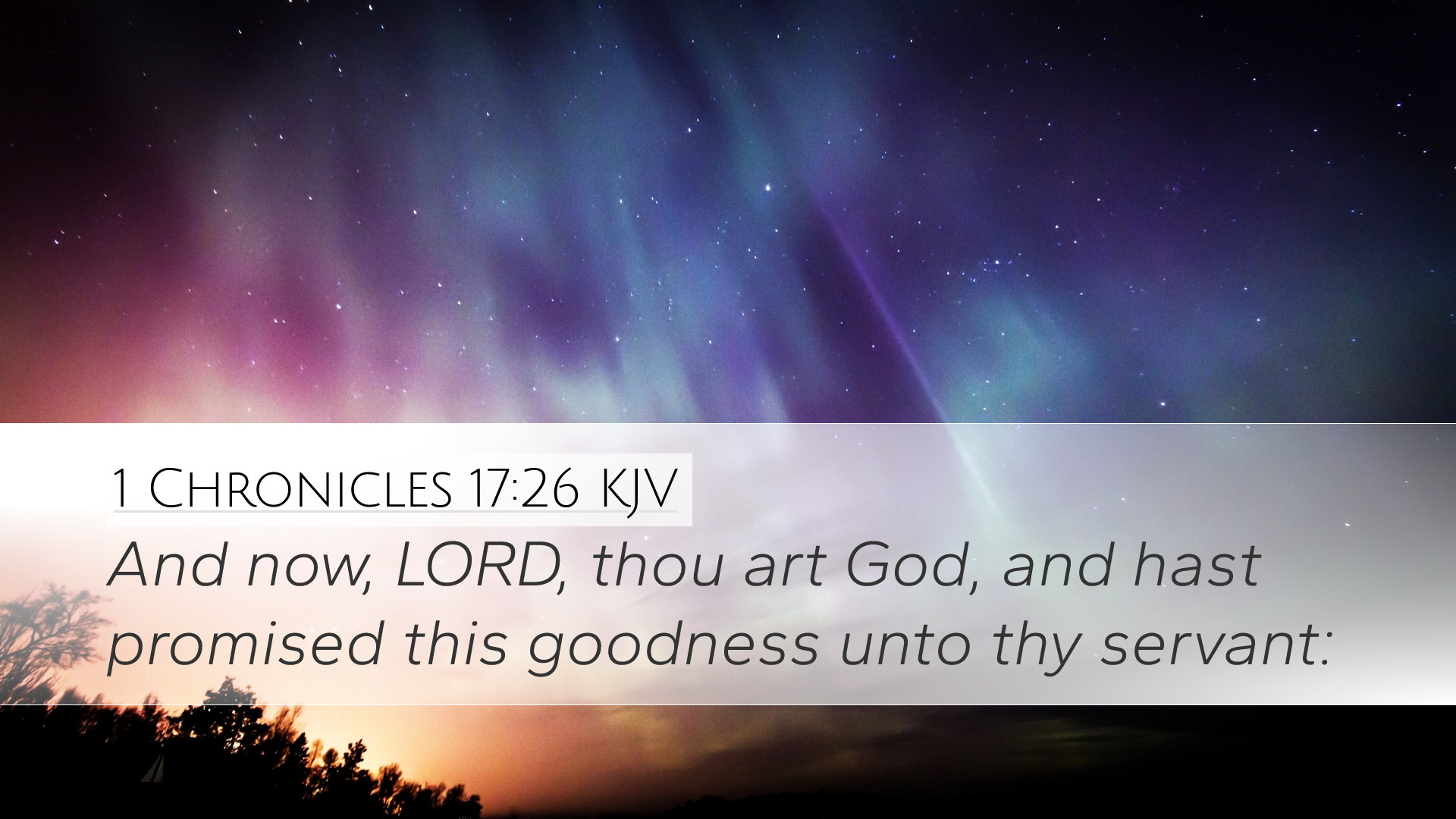Commentary on 1 Chronicles 17:26
Verse: "And now, O Lord, thou art God, and hast promised this goodness unto thy servant."
Introduction
This verse is situated within a pivotal moment in the biblical narrative where David acknowledges God’s sovereignty and the divine promise regarding his lineage and future kingdom. The context highlights a significant conversation between David and God, emphasizing the covenant relationship established between them.
Exegesis and Context
The feature of this verse lies in David’s passionate declaration of God’s nature and his acknowledgment of God’s goodness towards him. This underscores both David's humility and the reciprocal relationship between the sovereign King of Israel and Yahweh.
-
David’s Recognition of God:
In this verse, David starts with "O Lord, thou art God", which reflects an acknowledgment of God’s supremacy. As suggested by Matthew Henry, this recognition sets the tone for the entire prayer. David, as king, emphasizes his servitude before God, highlighting his understanding of God's authority.
-
The Nature of God’s Promises:
David acknowledges not only who God is but also what God has promised. The word "goodness" here, as referenced by Albert Barnes, includes the deliverance and blessings promised to David's house and lineage, embodying God's unwavering faithfulness.
-
The Posture of Prayer:
This verse exemplifies a proper attitude in prayer—humility before God and recognition of His gifts. Adam Clarke notes that true prayer combines adoration, acknowledgment, and a request for guidance which resonates throughout David’s address.
Theological Insights
The theological implications are profound when one considers God’s unchanging nature and the faithfulness He exhibits towards believers:
-
The Faithfulness of God:
This assurance of God's goodness signifies that He is committed to fulfilling His word. Matthew Henry elaborates that God’s promises serve as a source of comfort and strength, not only for David but for all who place their trust in Him.
-
The Divine Covenant:
The mention of God's promises points directly to the Davidic covenant, which is foundational to understanding God's redemptive plan. Albert Barnes indicates that this covenant transcends temporal concerns, signifying God’s eternal commitment to His people.
-
Human Response to Divine Grace:
David’s response to God’s promises serves as a powerful example for believers. Adam Clarke stresses the importance of recognizing our position and responding appropriately to God’s grace, which calls for both worship and obedience.
Practical Applications
From David’s proclamation, several practical applications arise for contemporary readers:
-
Embrace Humility:
Recognizing God’s sovereign role in our lives cultivates an attitude of humility. As David exemplified, understanding our position as servants leads to a deeper relationship with God.
-
Trust in God’s Promises:
Believers today are called to trust in God’s goodness, even in challenging circumstances. His faithfulness, as shown in David’s life, reassures us of His continual support and guidance.
-
Engage in Prayer:
This verse encourages an engaged prayer life. Taking time to acknowledge God’s character and express gratitude for His promises can profoundly deepen one's faith.
Conclusion
1 Chronicles 17:26 encapsulates a moment of deep reflection, prayer, and thanksgiving. David's acknowledgment of God's nature and His promises stands as a rich source of encouragement for all believers. Through public domain commentaries, we glean insights that highlight the enduring truth of God’s faithfulness and the proper human response to divine grace.
By pondering upon this verse, pastors, students, and theologians alike are challenged to deepen their understanding of God’s nature and to respond in faith and obedience, reiterating that the promises of God continue to resonate through time.


